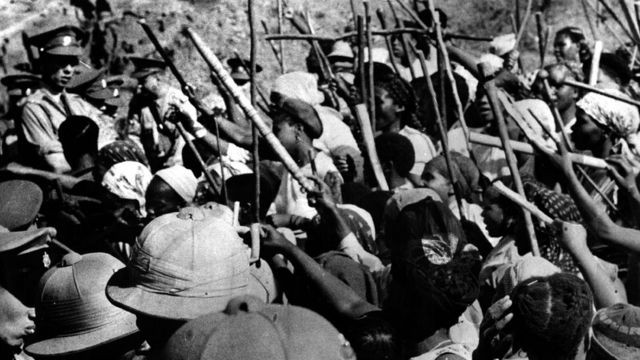
The Aba Women's War of 1929 stands out as a powerful testament to the resilience and courage of women in Nigeria. This pivotal event marked the first major revolt led exclusively by women, challenging the oppressive colonial policies imposed by the British.
The Prelude to the Uprising
The seeds of discontent were sown long before the outbreak of the war. In the late 1920s, the British colonial administration in Nigeria introduced new taxation policies, targeting both men and women. This was a significant shift, as traditionally, women were not subjected to such direct taxation. The situation was further exacerbated by the oppressive warrant chiefs, who abused their powers, leading to widespread dissatisfaction.
The Spark of Rebellion
In November 1929, the spark was ignited in the town of Oloko, when a female farmer named Nwanyeruwa confronted a tax assessor. Her defiance inspired thousands of Igbo women, who took up the cause and began to organize protests across the region. These women, drawn from various ethnic backgrounds, united in their demand for justice and an end to the unfair taxes.
Their voices were loud. Nwanyeruwa was irate. “You should be ashamed of yourself, Emereuwa!” She clapped her oily hands in front of the man who, only moments ago, had come into her compound to take a headcount.
“Look, woman, I don’t have time for your nonsense. Count your goats and sheep. How many are you in this compound?”
Nwanyeruwa, turned around as if pricked. “Was your widowed mother ever counted, eh, Emereuwa, answer me?”
At the mention of his mother’s name Emereuwa grabbed Nwanyeruwa by the throat. “Woman, you have crossed the line. Why do you have to insult my mother?”
So that fateful 18th of November, after her altercation with Emereuwa, Nwanyereuwa left her compound to report what had transpired to the women’s meeting holding currently at the village ilo.
The War Unfolds
The Aba Women's War, also known as the Women's Riot, was characterized by large-scale protests, demonstrations, and acts of civil disobedience. The women employed traditional practices such as "sitting on a man," a form of protest where they would surround and publicly shame corrupt officials. Their tactics were effective, as they managed to disrupt colonial administration and draw international attention to their cause.
The Aftermath and Legacy
The immediate outcome of the war was the colonial administration's decision to suspend the imposition of direct taxes on women and the curtailment of the warrant chiefs' powers. However, the long-term impact was even more significant. The Aba Women's War of 1929 is celebrated as a pivotal moment in the struggle for women's rights and anti-colonial movements in Nigeria. It highlighted the strength of collective action and set a precedent for future generations to challenge oppression and fight for justice.
Conclusion
The Aba Women's War of 1929 is a powerful reminder of the enduring spirit of resistance and the important role women have played in shaping history. Their courage and determination continue to inspire and serve as a beacon of hope for all who seek to challenge injustice and advocate for change.
Feel free to share this post, and let's keep the spirit of these remarkable women alive by remembering their contributions to history!










Comments